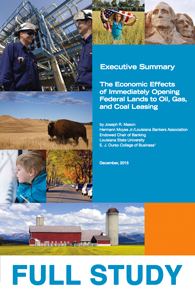The Institute for Energy Research released a study titled, “The Economic Effects of Immediately Opening Federal Lands to Oil, Gas, and Coal Leasing,” by Dr. Joseph Mason, a professor at Louisiana State University and a Senior Fellow at the Wharton School of the University of Pennsylvania. In the study, Dr. Mason assesses the economic benefits of expanding development of oil, gas, and coal resources on federal lands.
While headlines have reported declining oil, gas, and coal prices, those declines do not deter from the fact that U.S. energy resources are valuable to our domestic economic growth. The most recent government estimate of those benefits was a 2012 Congressional Budget Office (CBO) study, produced at the request of the House Budget Committee, which analyzed federal lease revenues that could be expected to arise from a proposal to open federal lands and waters to oil, gas, and coal extraction.
Specifically, the study aimed to estimate the fiscal benefits of opening areas that are statutorily or as a matter of administration policy prohibited from leasing. The issue has repeatedly been a hot-button political and economic issue in the past several years, having been discussed at the beginning of the Obama administration and then again as Republican challengers in the 2012 election placed opening the lands and waters at the center of their energy policy.
This paper highlights the continuing economic effects despite recent price declines, including benefits to economic growth, wages, jobs, and federal, state, and local tax revenues, from opening federal lands and waters to oil, gas, and coal leasing.
Key findings from the study include:
- GDP would increase by $127 billion annually in the next seven years, and $663 billion annually in the next thirty years
- $20.7 trillion cumulative increase in economic activity over the next thirty-seven years, simply by allowing Americans to go to work producing energy
- 552,000 jobs would be created annually over the next seven years, with 2.7 million jobs annually over the next thirty years
- $32 billion increase in annual wages over the next seven years, with a cumulative increase of $5.1 trillion over thirty-seven years
- The federal government would receive an additional $3.9 trillion in federal tax revenues over thirty-seven years, while state and local tax revenues would rise by $1.9 trillion over the same time period.
Click here to read the full report.
Click here for the executive summary.
